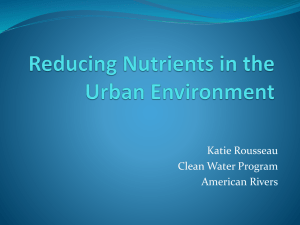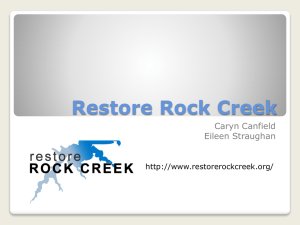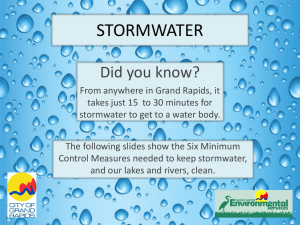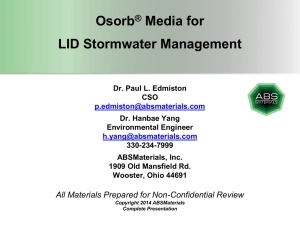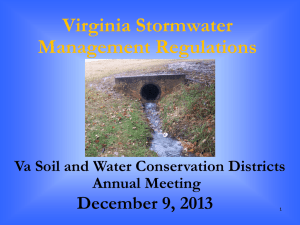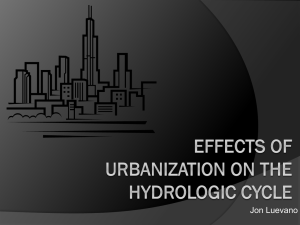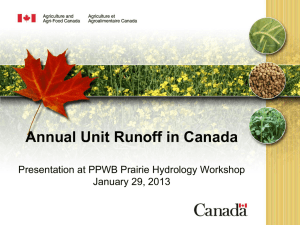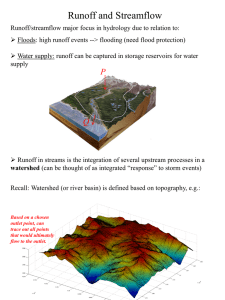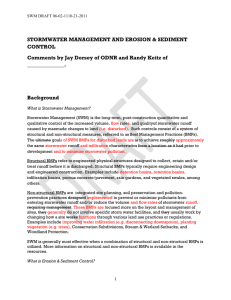Stormwater Runoff Management power point
advertisement
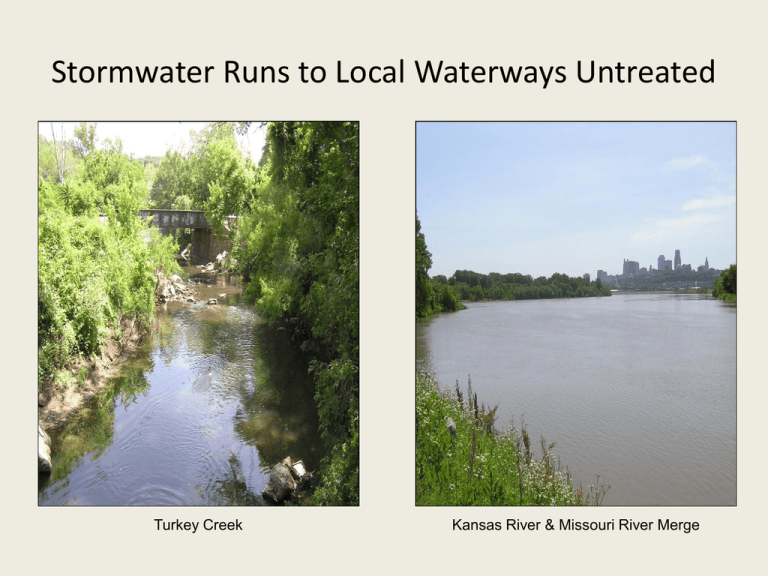
Stormwater Runs to Local Waterways Untreated Turkey Creek Kansas River & Missouri River Merge Stormwater Runoff Management Illustration from Mid America Regional Council Stormwater Runoff • Water falls as rain, snow, or ice. Most seeps into ground. Stormwater Flows over surfaces such as roads, driveways and parking lots. • If ground is saturated, frozen, or has paved surfaces, water flows & is called stormwater runoff. Where does Stormwater Go? Stormwater goes into storm drains and pollutants flow untreated into local streams, rivers & lakes. • Stormwater flows to storm drains along streets. • It may carry soil, pet waste, oil, pesticides, & other pollutants with it. • This polluted runoff goes to streams & lakes untreated. Sediment Pollution • Sediment comes from soil erosion & from decomposition of plants and animals. • Sediment will make streams & lakes cloudy. • Sediment is the most common pollutant. Sediment has flowed to storm drain and closed it from functioning. How Can I Reduce Sediment Runoff? • Avoid mowing 10-15 feet of creek or stream. This will minimize erosion & help filter sediment. Don’t mow right up to stream bed • Sweep driveways, don’t hose them off. Otherwise sediment flows to storm drain. Oil & Auto Fluid Pollution • E.P.A. estimates that 200 million gallons of oil are improperly disposed each year. Oil illegally dumped flows untreated to area streams, rivers, and lakes. • One quart of oil can contaminate one million gallons of water. How Can I Reduce Oil Runoff? • Fix vehicles that are leaking fluids. • If you change your own oil, store it in a container and dispose of properly. • Wyandotte County residents use HHW site. For Info call 913-573-5400 Dispose of your Oil & Auto fluids properly. Septic System Pollution • E.P.A. estimates that 25% of homes use septic systems. Liquids surfacing from non functioning septic system. • Over 4 billion gallons of wastewater per day is dispersed below ground thru septic systems. How Can I Reduce Septic Runoff? Do your washing over several days. • Have septic system pumped regularly. • Fix any faulty septic system. • Fix faulty toilets to save water going thru system. • Do laundry over several days so you don’t send water to system at once. Lawn Chemical Pollution • Lawn chemicals are fertilizers, herbicides, & insecticides. • Over application can cause toxic levels of chemicals & excessive nutrient runoff. Would you walk with bare feet in your lawn? How Can I Reduce Lawn Chemical Runoff? • Conduct a soil test. • Don’t over fertilize. • Use chemicals according to the instructions. Consider using compost on your lawn • Landscape with native plants. Pet Waste Pollution • Each rain, thousands of pounds of pet waste flows into local streams. • U.S. Geological Survey showed 25% of bacteria in area K.C. streams is caused by pet waste. Flier from Mid America Regional Council, KC Mo. How Can I Reduce Pet Waste Runoff? • Pickup pet waste from your yard. • When walking your pet pickup after them. Education to residents from an area home owner’s association. • Involve home owner’s association. Car Wash Pollution • If you wash your car on your driveway, polluted water flows to storm drain. Water flows to storm drains • Pollutants can include soap, detergents, salt, rust, motor oils, and fluids. How Can I Reduce Car Wash Runoff? Use a Commercial Car Wash • Use commercial car wash. • If you wash car at home, wash on area that will absorb water. • Use biodegradable, phosphate-free, water based cleaners. • Empty wash bucket into sink or toilet. Litter and Trash Pollution • Trash and litter is carried off to storm drains. • Keep America Beautiful indentifies cigarette litter as the #1 littered item. Trash & Litter carried off to block storm drain. How Can I Reduce Litter & Trash Runoff? • Don’t litter. • Participate in a neighborhood litter cleanup event. Participate in a Neighborhood Cleanup. • Pickup litter in your own yard. Yard Waste Pollution • Leaves & grass clippings are blown into the streets. • Water & wind carry them to storm drains. • Not only can they clog drains, they adversely affect oxygen levels in local waterways. Leaves blocking flow of water into storm drain. How Can I Reduce Yard Waste Runoff? • Never blow leaves or grass clippings into street. • Consider using a mulch mower and leave clippings and leaves on the yard. Consider Using a Mulch Mower • Consider backyard composting. Stormwater Runoff Management What Can I Do To Help? •Sweep your driveway off. •Dispose of oil & automotive fluids proper and legally. •Maintain septic systems. •Don’t over fertilize yard. •Pickup pet waste •Use a commercial car wash. •Pick up litter and trash. •Don’t blow yard clippings and leaves into the streets. Help Keep our Waterways Cleaner Wyandotte County Lake
